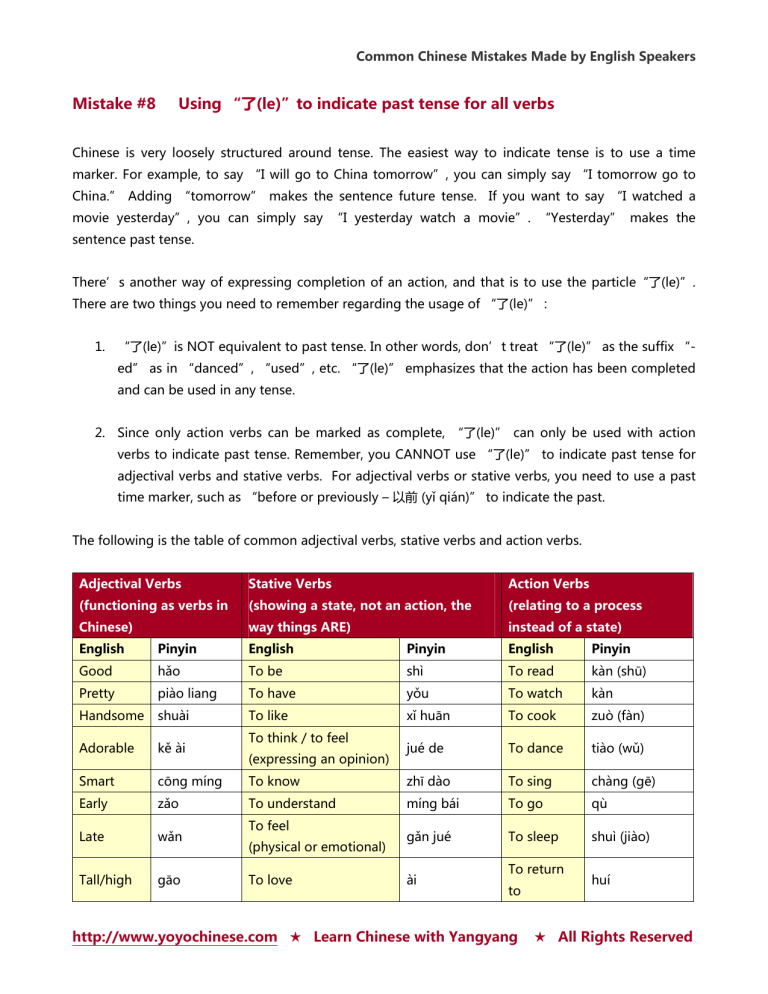
Common Chinese Mistakes Made by English Speakers
Mistake #8
Using “了(le)”to indicate past tense for all verbs
Chinese is very loosely structured around tense. The easiest way to indicate tense is to use a time
marker. For example, to say “I will go to China tomorrow”, you can simply say “I tomorrow go to
China.” Adding “tomorrow” makes the sentence future tense. If you want to say “I watched a
movie yesterday”, you can simply say “I yesterday watch a movie”. “Yesterday” makes the
sentence past tense.
There’s another way of expressing completion of an action, and that is to use the particle“了(le)”.
There are two things you need to remember regarding the usage of “了(le)” :
1. “了(le)”is NOT equivalent to past tense. In other words, don’t treat “了(le)” as the suffix “ed” as in “danced”, “used”, etc. “了(le)” emphasizes that the action has been completed
and can be used in any tense.
2. Since only action verbs can be marked as complete, “了(le)” can only be used with action
verbs to indicate past tense. Remember, you CANNOT use “了(le)” to indicate past tense for
adjectival verbs and stative verbs. For adjectival verbs or stative verbs, you need to use a past
time marker, such as “before or previously – 以前 (yǐ qián)” to indicate the past.
The following is the table of common adjectival verbs, stative verbs and action verbs.
Adjectival Verbs
Stative Verbs
Action Verbs
(functioning as verbs in
(showing a state, not an action, the
(relating to a process
Chinese)
way things ARE)
instead of a state)
English
Pinyin
English
Pinyin
English
Pinyin
Good
hǎo
To be
shì
To read
kàn (shū)
Pretty
piào liang
To have
yǒu
To watch
kàn
Handsome
shuài
To like
xǐ huān
To cook
zuò (fàn)
Adorable
kě ài
jué de
To dance
tiào (wǔ)
Smart
cōng míng
To know
zhī dào
To sing
chàng (gē)
Early
zǎo
To understand
míng bái
To go
qù
Late
wǎn
gǎn jué
To sleep
shuì (jiào)
Tall/high
gāo
To think / to feel
(expressing an opinion)
To feel
(physical or emotional)
To love
ài
To return
to
http://www.yoyochinese.com ★ Learn Chinese with Yangyang
huí
★ All Rights Reserved
Common Chinese Mistakes Made by English Speakers
Big
dà
Small
xiǎo
To want
To want to (do
something)
yào
To buy
mǎi
xiǎng
To say
shuō
The following table summarizes how to indicate past tense for adjectival verbs, stative verbs and action
verbs.
English
Pinyin
Chinese
Adjectival verbs – Adding a past time marker “previously or before”
She was beautiful.
(lit. She before beautiful.)
I was lazy.
(lit. I before lazy.)
tā yǐ qián hěn piào liɑnɡ 。
wǒ yǐ qián hěn lǎn 。
她以前很漂亮。
我以前很懒。
我以前很懶。
Stative verbs - Adding a past time marker “previously or before”
I was a teacher before.
(lit. I before am teacher.)
wǒ yǐ qián shì lǎo shī 。
I had lots of money.
(lit. I before have lots of
wǒ yǐ qián yǒu hěn duō qián 。
money.)
我以前是老师。
我以前是老師。
我以前有很多钱。
我以前有很多錢。
Action verbs – “Adding le”
I ate three hamburgers.
wǒ chī le sān ɡe hàn bǎo bāo 。
He went home.
tā huí jiā le 。
I bought lots of stuff.
wǒ mǎi le hěn duō dōnɡ xi 。
我吃了三个汉堡包。
我吃了三個漢堡包。
他回家了。
我买了很多东西。
我買了很多東西。
3. If a stative verb or adjectival verb is followed by “了(le)”, the meaning is “change of status”
rather than “completeness of an action”.
Examples
English
Pinyin
Chinese
tā bú piào liɑnɡ le 。
她不漂亮了。
wǒ lèi le 。
我累了。
Adjectival verbs
She is no longer beautiful.
(lit. She not beautiful le.)
I am tired now.
(lit. I tired le.)
http://www.yoyochinese.com ★ Learn Chinese with Yangyang
★ All Rights Reserved
Common Chinese Mistakes Made by English Speakers
Stative verbs
I don’t love you any more.
(I don’t love you le.)
She is a mother now.
(lit. She is mother le.)
Now I understand.
(lit. I understand le.)
wǒ bú ài nǐ le 。
tā shì mā mɑ le 。
wǒ mínɡ bái le 。
我不爱你了。
我不愛你了。
她是妈妈了。
她是媽媽了。
我明白了。
http://www.yoyochinese.com ★ Learn Chinese with Yangyang
★ All Rights Reserved







